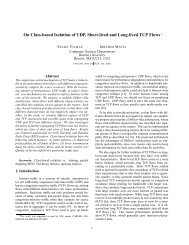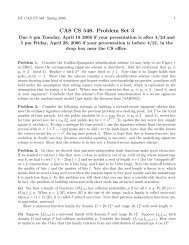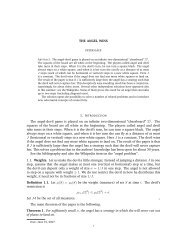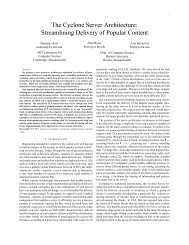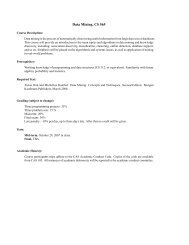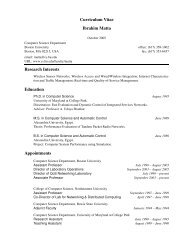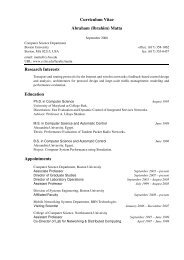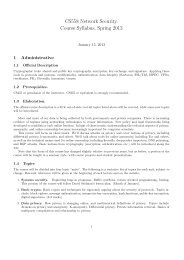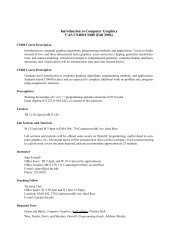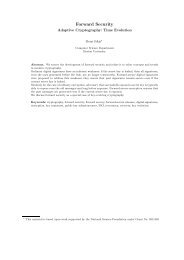uniform test of algorithmic randomness over a general ... - CiteSeerX
uniform test of algorithmic randomness over a general ... - CiteSeerX
uniform test of algorithmic randomness over a general ... - CiteSeerX
Create successful ePaper yourself
Turn your PDF publications into a flip-book with our unique Google optimized e-Paper software.
14 PETER GÁCS<br />
4.1.3. Expressing the <strong>uniform</strong> <strong>test</strong> in terms <strong>of</strong> complexity. It is a natural idea to modify equation<br />
(4.3) in such a way that the complexity H(x) is replaced with H(x | µ). However,<br />
this expression must be understood properly. The measure µ (especially, when it is not<br />
computable) cannot be described by a finite string; on the other hand, it can be described<br />
by infinite strings in many different ways. Clearly, irrelevant information in these infinite<br />
strings should be ignored. The notion <strong>of</strong> representation in computable analysis (see Subsection<br />
C.1) will solve the problem. An interpreter function should have the property that<br />
its output depends only on µ and not on the sequence representing it. Recall the topological<br />
space M <strong>of</strong> computable measures <strong>over</strong> our space X. An interpreter A : {0, 1} ∗ × M → Σ ∗<br />
is a computable function that is prefix-free in its first argument. The complexity<br />
H(x | µ)<br />
can now be defined in terms <strong>of</strong> such interpreters, noting that the Invariance Theorem holds<br />
as before. To define this complexity in terms <strong>of</strong> representations, let γ M be our chosen<br />
representation for the space M (thus, each measure µ is represented via all <strong>of</strong> its Cauchy<br />
sequences in the Prokhorov distance). Then we can say that A is an interpreter if it is<br />
(id, γ M , id)-computable, that is a certain computable function B : {0, 1} ∗ ×Σ ω → Σ ∗ realizes<br />
A for every p ∈ {0, 1} ∗ , and for every sequence z that is a γ M -name <strong>of</strong> a measure µ, we<br />
have B(p, z) = A(p, µ).<br />
Remark 4.7. The notion <strong>of</strong> oracle computation and reducibility in the new sense (where the<br />
result is required to be independent <strong>of</strong> which representation <strong>of</strong> an object is used) may be<br />
worth investigating in other settings as well.<br />
♦<br />
Let us mention the following easy fact:<br />
Proposition 4.8. If µ is a computable measure then H(x | µ) + = H(x). The constant in + =<br />
depends on the description complexity <strong>of</strong> µ.<br />
Theorem 3. If X is the discrete space Σ ∗ then we have<br />
d µ (x) + = − log µ(x) − H(x | µ). (4.5)<br />
Note that in terms <strong>of</strong> the <strong>algorithmic</strong> entropy notation introduced in (4.1), this theorem<br />
can be expressed as<br />
H µ (x) + = H(x | µ) + log µ(x). (4.6)<br />
Pro<strong>of</strong>. In exponential notation, equation (4.5) can be written as t µ (x) = ∗ m(x | µ)/µ(x). Let<br />
us prove > ∗ first. We will show that the right-hand side <strong>of</strong> this inequality is a <strong>test</strong>, and hence<br />
∗<br />
< t µ (x). However, the right-hand side is clearly lower semicomputable in (x, µ) and when<br />
we “integrate” it (multiply it by µ(x) and sum it), its sum is 1; thus, it is a <strong>test</strong>.<br />
Let us prove < ∗ now. The expression t µ (x)µ(x) is clearly lower semicomputable in (x, µ),<br />
and its sum is 1. Hence, it is + < m(x | µ).<br />
Remark 4.9. As mentioned earlier, our theory <strong>general</strong>izes to measures that are not probability<br />
measures. In this case, equation (4.6) has interesting relations to the quantity called<br />
“physical entropy” by Zurek in [25]; it justifies calling H µ (x) “fine-grained <strong>algorithmic</strong><br />
Boltzmann entropy” by this author in [9].<br />
♦<br />
For non-discrete spaces, unfortunately, we can only provide less intuitive expressions.<br />
□





